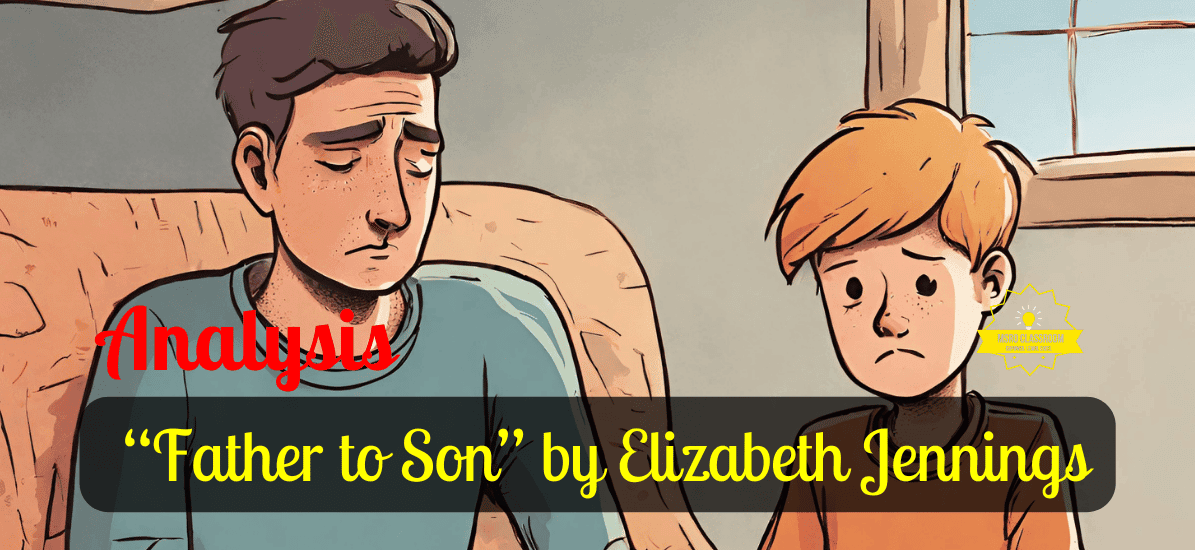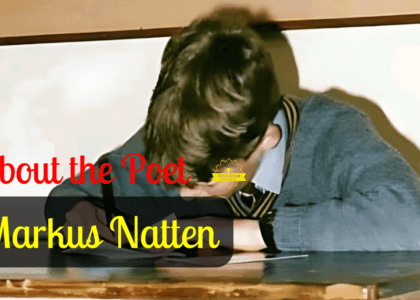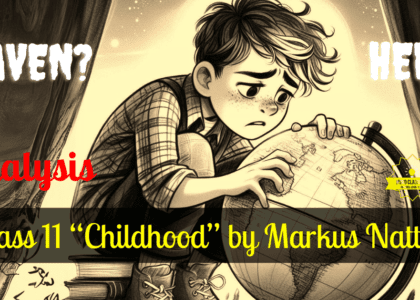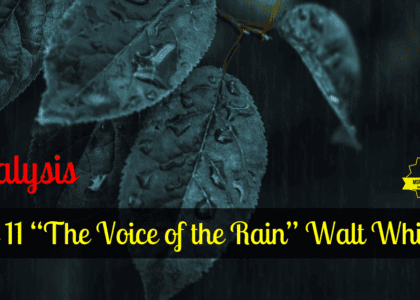Poem 5, Elizabeth Jennings’ “Father to Son,” Summary, Analysis, Central Idea, Stanza-Wise Explanation, Line-by-Line Explanation, and Question Answers.
Poem 5- Father to Son by Elizabeth Jennings:
Elizabeth Jennings
Elizabeth Jennings (1926-2001) was an English poet known for her thoughtful and introspective verse. Her poetry often delves into themes of love, loss, spirituality, and the human experience. Elizabeth Jennings’ poetry remains highly regarded for its skillful use of language to convey deep emotions and universal themes.

Table of Contents
Previous: “Childhood” by Markus Natten, “The Voice of the Rain“ by Walt Whitman
Supplementary Reader: Class 11 ‘Snapshots‘
Elizabeth Jennings’ ‘Father to Son’ was first published in ‘Recoveries‘ in 1964 and later in the more famous collection ‘Collected Poems‘ in 1967.
Summary “Father to Son”:
The poem “Father to Son” By Elizabeth Jennings explores the complex relationship between a father and his son, highlighting their emotional distance and lack of understanding despite living together for years. The father reflects on his struggles to connect with his son and understand his interests and passions. He wonders if he has failed as a parent, questioning whether he has stifled his son’s growth or could not provide him with the necessary support.
The father longs for a deeper connection with his son, hoping for reconciliation and forgiveness. However, despite their efforts to bridge the gap, they remain distant and unable to comprehend each other’s emotions and experiences fully. The poem ultimately portrays the universal struggle for connection and forgiveness within familial relationships, emphasising the complexities of parenthood and the human experience.
Central Idea “Father to Son”:
The poem explores the complex challenges in parent-child relationships, especially the difficulty of forming a deep connection and the pain of seeing a child grow independent.
Explanation “Father to Son”:
‘Father to Son’ by Elizabeth Jennings is a poignant and introspective poem that explores the complexities of a father’s relationship with his son. The father struggles to understand and connect with his child, even though they have lived together for years. The poem dives into the themes of distance, misunderstanding, and the desire for reconciliation.
- In the first stanza, the father confesses that despite living together, he feels like a stranger to his son. He admits to knowing nothing about his child and attempts to build a relationship by reminiscing when his son was small. The father questions whether he has stifled his son’s potential or planted the seeds of his dreams in the child’s life, leaving no room for his son’s individuality to grow.
- The second stanza reflects the emotional distance between the father and son. They speak without understanding, and silence seems to permeate their conversations. The father wishes for his son to return to the familiar comfort of his father’s house, the home he knew, rather than forging his path and creating a new world.
- The third stanza emphasises the father’s desire for forgiveness. He wants to reconcile with his son and shape a new bond from their sorrow. Despite the emotional gulf, they live on the same planet and inhabit the same land, sharing a common existence.
- In the final stanza, the father and son are portrayed as longing for connection and forgiveness. Both are reaching out with empty hands, longing for reconciliation and understanding. The son’s anger, born out of grief, mirrors the father’s emotions, emphasising the shared struggle and longing for reconciliation.
‘Father to Son’ captures the struggles of parent-child relationships, where love and distance can coexist. The poem explores the difficulty of communication and the desire for understanding and forgiveness, making it a poignant reflection on the intricacies of familial bonds.
Analysis “Father to Son”:
1. First Stanza:
- Father reflects on the emotional distance between him and his son despite living together.
- He attempts to connect through memories but questions if he has stifled his son’s individuality.
2. Second Stanza:
- Father realises he has shaped his son’s life, yet they are strangers with different interests.
- Struggles to comprehend his son’s unique identity and choices.
3. Third Stanza:
- Father acknowledges the emotional silence between them.
- He desires his son to return to the familiar home but understands the son’s need for independence.
- Recognition of the need for forgiveness and acceptance.
4. Final Stanza:
- Father and son both face human struggles and long for reconciliation.
- Tension remains, but there is hope for connection through the “empty hand.”
5. Tone:
- Explores generational gaps and complex parent-child relationships.
- Reflective, melancholic, with a tone of regret and longing for a deeper connection.
6. Form & Structure:
- Type: Lyric poem, also a dramatic monologue where the father speaks directly to his son.
- Contrast: Contrasts father’s wish for his son to return with the son’s desire for autonomy.
- Ambuguity: Open to interpretation, making it universal and relatable.
Theme “Father to Son”:
The poem’s central theme is the generational gap and the challenges parents face in understanding their children as they grow and establish their identity.
- Miscommunication and Emotional Distance: The poem’s central theme revolves around the miscommunication and emotional distance between the father and his son. Despite living together in the same house for years, they seem like strangers to each other. The poem highlights the challenge of truly understanding and connecting with one’s family.
- Time and Change: The poem reflects on the passage of time and the changes it brings. The father observes how his son has grown and evolved, and he struggles to accept these changes. This theme highlights the inevitability of change and the difficulty of accepting it.
- Desire for Reconciliation: The father strongly desires reconciliation with his son throughout the poem. He hopes his son will return to the metaphorical “father’s house,” seeking a deeper connection and understanding. This theme speaks to the universal desire for harmonious family relationships and the hope for healing and reconciliation.
- Forgiveness: Forgiveness is another significant theme in the poem. The father is willing to forgive the emotional distance and misunderstandings between him and his son. He envisions a future where they can move past their difficulties and shape a new, more loving relationship based on forgiveness and understanding.
- Loneliness and Longing: The poem conveys a sense of loneliness and longing, both on the part of the father and the son. Both characters yearn for a deeper connection, and a sense of belonging, and their inability to achieve this connection contributes to their feelings of isolation.
- The Universal Struggle of Parenting: “Father to Son” explores the challenges and complexities of parenting. It portrays the father’s struggle to relate to and understand his child, a theme that resonates with parents who may struggle to bridge generational gaps and connect with their children.
Video Explanation “Father to Son”:
Duration: 17 Minutes
Chapters and Subtitles available
Line-by Line Explanation “Father to Son”:
1. “I do not understand this child”
The father confesses that he doesn’t fully comprehend his child, despite living together for years. He feels a lack of emotional connection with his son.
2. “Though we have lived together now”
The father acknowledges the physical proximity of living in the same house with his son but realises that emotional distance persists.
3. “In the same house for years. I know”
The father admits that he knows little about his son’s inner world or true feelings.
4. “Nothing of him, so try to build”
Because of the lack of understanding, the father attempts to reconstruct or establish a relationship based on memories of his son when he was younger.
5. “Up a relationship from how”
The father tries to create a connection based on his son’s behaviour and personality as a child.
6. “He was when small. Yet have I killed”
The father questions whether his attempts to understand and connect with his son have been unsuccessful or detrimental.
7. “The seed I spent or sown it where”
The father wonders if he has wasted his efforts to nurture their relationship or if he planted the seeds of their connection in the wrong place.
8. “The land is his and none of mine?”
The father contemplates whether the son’s world and interests are entirely separate from his own, making it challenging to relate to each other.
9. “We speak like strangers, there’s no sign”
Despite living together, the father and son communicate with each other as if they are strangers, indicating a lack of emotional intimacy.
10. “Of understanding in the air.”
The atmosphere between them is tense and lacking in mutual comprehension.
11. “This child is built to my design”
The father acknowledges that his son is a product of his upbringing and influence.
12. “Yet what he loves I cannot share.”
Despite their shared background, the father finds connecting with his son’s interests and passions difficult.
13. “Silence surrounds us. I would have”
The father observes that silence dominates their relationship, implying a lack of open communication.
14. “Him prodigal, returning to”
The father wishes his son would return to their familiar home, seeking to rekindle their lost connection.
15. “His father’s house, the home he knew,”
The father longs for his son to return to the familiarity of their shared past.
16. “Rather than see him make and move”
The father would prefer his son stay close and not embark on his independent journey and create his world.
17. “His world. I would forgive him too,”
Despite his desire for his son to stay, the father admits he would forgive him for pursuing his path.
18. “Shaping from sorrow a new love.”
The father is willing to accept his sadness and adapt to a new understanding and love for his son.
19. “Father and son, we both must live”
The father recognises they are bound as family members and must continue living side by side.
20. “On the same globe and the same land,”
Both father and son share the same physical space on Earth, highlighting their familial connection.
21. “He speaks: I cannot understand”
The son shares his feelings and perspective, but the father admits that he struggles to comprehend his son fully.
22. “Myself, why anger grows from grief.”
The father reflects on his emotions and finds it difficult to understand why his grief leads to anger.
23. “We each put out an empty hand,”
Both father and son reach out to each other, seeking a connection, but they find their hands empty, implying a lack of understanding.
24. “Longing for something to forgive.”
Despite their difficulties in understanding each other, both father and son long for reconciliation and forgiveness, indicating their underlying love and desire to rebuild their relationship.
Literary Devices “Father to Son”:
Question Answers “Father to Son”:
Think it out:
Q1: Does the poem talk of an exclusively personal experience or is it fairly universal?
A1: The poem explores a deeply personal experience between a father and his son, but its themes of misunderstanding, distance, and longing for connection are universal, resonating with anyone who has struggled to understand or connect with a loved one.
Q2: How is the father’s helplessness brought out in the poem?
A2: The father’s helplessness is brought out through his inability to understand his son despite their shared history of living together for years. He tries to build a relationship based on memories of his son as a child but finds himself unable to bridge the gap between them. This sense of helplessness is also evident in his desire for his son to return to the familiar, even if it means forgiving him for straying, and in his acknowledgement of his inability to comprehend his son’s feelings and motivations.
Q3: Identify the phrases and lines that indicate the distance between father and son.
A3: Phrases and lines indicating the distance between father and son include:
- “I know nothing of him”
- “We speak like strangers”
- “Silence surrounds us”
- “He speaks: I cannot understand myself”
These lines highlight the emotional and communicative gap between them, emphasising their inability to connect despite their physical proximity and familial relationship.
Q4: Does the poem have a consistent rhyme scheme?
A4: The poem needs a consistent rhyme scheme. Stanzas 1,2, and 3 follow the same rhyming pattern, ABBABA, while stanza 4 follows ABBCBA.
| Stanza 1 | Stanza 2 | Stanza 3 | Stanza 4 |
| Child- A now-B know-B build-A how-B killed-A | Child- A now-B know-B build-A how-B killed-A | have-A to-B knew-B move-A too-B love-A | live-A land-B understand-B grief-C hand-B forgive-A |
Extra Questions “Father to Son”:
Q1: In Elizabeth Jennings’s poem’ Father to Son, ‘ what is the speaker’s relationship with the child?
A1: The speaker is the father, and the child is his son. The poem explores the emotional distance and lack of understanding between the father and his son despite living together in the same house for years.
Q2: How does the speaker feel about his son in the poem?
A2: The speaker feels disconnected and distant from his son. He admits to not understanding his child and acknowledges their lack of communication and shared interests.
Q3: How does the speaker describe his attempts to understand his son?
A3: The speaker tries to understand his son by recalling how he was when he was small, hoping to build a relationship based on those memories. However, he feels his efforts may have been in vain, wondering if he has “killed the seed” or sown it in unfamiliar territory.
Q4: What does the father desire for his son’s future?
A4: The father desires his son to return to the familiar, to his father’s house, rather than forging his path and creating his world. He longs for his son to return and seek forgiveness rather than becoming distant and independent.
Q5: What is the poem’s father’s perspective on forgiveness and love?
A5: The father is willing to forgive his son, even if there has been sorrow or misunderstanding between them. He wants to shape a new love from the pain and distance they have experienced.
Q6: How is the theme of silence portrayed in the poem?
A6: The poem highlights the theme of silence in the relationship between the father and son. They speak “like strangers,” and there is no sign of understanding in the air, emphasising their lack of communication and emotional distance.
Q7: What is the significance of the line “Longing for something to forgive” in the poem?
A7: This line suggests that the father and son yearn for reconciliation and a chance to forgive each other. This indicates a desire to bridge their emotional gap and find understanding and connection. It reflects the complexities of their relationship and their shared desire for reconciliation.
Extract Based Questions “Father to Son”:
Extract 1:
“I do not understand this child
Lines 1-3
Though we have lived together now
In the same house for years.”
Q1: What is the central theme or issue the speaker is expressing in this part of the poem?
A1: The central theme is the speaker’s inability to understand or connect with their child despite living together for years.
Q2: How does the speaker feel about the lack of understanding with their child?
A2: The speaker appears to feel a sense of frustration or disappointment about their inability to understand their child despite the years they’ve spent together.
Extract 2:
“This child is built to my design
Lines 11-12
Yet what he loves I cannot share.”
Q1: What paradox or contradiction does the speaker express about their child in this passage?
A1: The speaker describes a paradox where their child is “built to [their] design,” yet they cannot share or relate to what their child loves, suggesting a disconnect between them.
Q2: What emotion does the speaker convey regarding their child’s interests?
A2: The speaker appears to convey a sense of estrangement or alienation from their child’s interests, possibly feeling isolated or unable to connect with them.
Extract 3:
“Father and son, we both must live
Lines 19-20
On the same globe and the same land,”
Q1: What commonality does the speaker acknowledge in this part of the poem?
A1: The speaker recognises the commonality of living on the same planet and the same physical land with their son, emphasising their shared existence.
Q2: What is the speaker’s hope or desire for their relationship with their son?
A2: The speaker hopes for reconciliation and forgiveness in their relationship with their son, as indicated by their longing for something to forgive and their desire for understanding and connection.
Extract 4:
“We speak like strangers, there’s no sign
Lines 9-10
Of understanding in the air.”
Q1: How does the speaker characterise the communication between them and their child?
A1: The speaker describes their communication as distant and strained, comparing it to how strangers speak, with a lack of mutual understanding.
Q2: What does the speaker highlight as the notable absence in their interactions with their child?
A2: The speaker emphasises the lack of knowledge in their interactions with their child, suggesting a profound disconnect between them.
Extract 5:
“Silence surrounds us. I would have
Lines 13-15
Him prodigal, returning to
His father’s house, the home he knew,”
Q1: What biblical reference or metaphor does the speaker employ in this passage?
A1: The speaker uses the biblical metaphor of the prodigal son, expressing a desire for their child to return to the familiarity of their father’s house.
Q2: What does the speaker’s desire for their child to be “prodigal” reveal about their emotional state?
A2: The speaker’s desire for their child to be “prodigal” suggests a longing for reconciliation, forgiveness, and a return to a more harmonious relationship with their child.
Q3: What is the speaker’s attitude towards the prevailing silence between them and their child?
A3: The speaker appears uncomfortable with the quiet and wishes for a more open and communicative relationship with their child.
Q4: What does the phrase “returning to his father’s house, the home he knew” signify in the poem’s context?
A4: This phrase indicates the speaker’s desire for their child to reconnect with their familial roots and shared history, seeking a return to a more familiar and loving relationship
Extract 6:
“We each put out an empty hand,
Lines 23-24
Longing for something to forgive.”
Q1: What action do the father and son take, as mentioned in this part of the poem?
A1: The father and son “put out an empty hand,” indicating their desire for reconciliation and a gesture of reconciliation.
Q2: What emotional state or sentiment does the phrase “longing for something to forgive” convey?
A2: The term “longing for something to forgive” describes a yearning for healing and resolution, suggesting that both the father and son are willing to let go of past grievances and seek forgiveness to repair their relationship.
Q3: What does the act of the father and the son putting out “an empty hand” symbolise in this passage?
A3: The act of the father and the son putting out “an empty hand” symbolises their mutual desire for reconciliation and forgiveness, indicating a willingness to start anew.
Extract 7:
“The seed I spent or sown it where
Lines 7-8
The land is his and none of mine?”
Q1: What does the speaker question regarding the seed in this passage?
A1: The speaker questions whether the seed they invested in their child’s upbringing has grown in a way that aligns more with their child’s identity and interests than their own.
Q2: What does the speaker imply about their child’s autonomy in this excerpt?
A2: The speaker suggests that their child has grown into a person with their own land (life) separate from the speaker’s, indicating a recognition of their child’s autonomy.
Extract 8:
“He speaks: I cannot understand
Lines 21-22
Myself, why anger grows from grief.”
Q1: What does the child express regarding their feelings in this part of the poem?
A1: The child expresses their confusion and inability to understand why anger arises from grief within themselves.
Q2: What does the child’s statement about anger and grief suggest about their emotional state?
A2: The child’s view implies that they struggle to manage complex and conflicting emotions, which may contribute to their disconnect from their parents.
Extract 9:
“We both must live
Lines 19-20
On the same globe and the same land,”
Q1: What does the speaker emphasise about their shared existence in this passage?
A1: The speaker emphasises the certainty of the father and son living together on the same planet and land, underlining their inescapable connection.
Q2: What does the speaker’s acknowledgement of their shared world imply about their relationship with their child?
A2: The speaker’s acknowledgement of their shared world suggests recognising their fundamental bond, even as they grapple with their differences and misunderstandings.
Extract 10:
“I would forgive him too,
Lines 18-19
Shaping from sorrow a new love.”
Q1: What does the speaker express a willingness to do in this part of the poem?
A1: The speaker desires to forgive their child, even as they acknowledge the sorrow or difficulties in their relationship, hoping to create a new sense of love.
Q2: What does the phrase “shaping from sorrow a new love” convey about the speaker’s perspective?
A2: This phrase describes the speaker’s desire to transform their troubled relationship with their child into something positive and loving despite their challenges. It signifies their hope for reconciliation and growth.
Extract 11:
“We speak like strangers, there’s no sign
Lines 9-10
Of understanding in the air.”
Q1: How does the speaker characterise the current communication state with their child?
A1: The speaker describes their communication as distant and disconnected, likening it to speaking with strangers and noting the absence of mutual understanding.
Q2: What does the absence of “understanding in the air” suggest about their relationship?
A2: The absence of understanding indicates a significant lack of emotional connection and shared experience between the speaker and their child.





